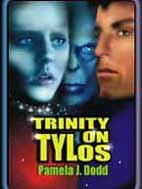Science Fiction Themes in Trinity on Tylos

Recently, a reader asked what influences were at work in my mind when I wrote Trinity on Tylos. Writing a novel takes quite a bit of time, so I usually have several themes which become interwoven as the story comes together. Several years ago, I read some literary criticism of serious sci-fi, as well as Brian Aldiss’ excellent history of science fiction, Billion Year Spree. Some of the themes I used come from those readings, while others came from various stories and visual media which I’ve enjoyed over the years.
Spoiler alert— skip this post if you haven’t yet read Trinity on Tylos and don’t want to be tipped off regarding plot elements.
Military— In reality, machines are doing more to conquer space than man is doing right now, but military force has historically been necessary to keep order and hold territories won by peaceful means as well as by force. Therefore, many writers have postulated that the military will be central to the conquest of space when that finally occurs. Having Venice be a Marine helps build her character, of course, but it’s quite logical to have military people, with their training and discipline, at the forefront of exploration.
Man vs. Machine— For the most part, this oft used theme is dispensed with in a single scene in Trinity. Venice stands before the triumphant Azareel, who informs his captives of their new status as concubines, or simply breeders. Having learned that many of the Archeons are android servants, Venice asks why he doesn’t use them as parents, and Azareel explains that she and her companion, despite being aliens, will make better mothers than any android. Thus, in my novel, man wins over machine.
Utopia/Dystopia— This is a rather depressing theme, but one which is often found in speculative fiction, especially in the more serious tomes. Basically, while attempting to create a perfect society, mankind has a tendency to create just the opposite, a society lacking in individual freedoms. Although it isn’t the main theme, in order to re-create the Archeons, Azareel must first dupe the humans, and then he deprives his captives of much of the self-determination which is so important to happiness.
Galactic Empires— Space operas usually depend on some aspect of this theme. An empire can be viewed in a positive light, but more often than not, the large entity oppresses the smaller, and rebellion or some sort of warfare ensues. The Praxians are the empire in Trinity on Tylos, and Venice must resort to subterfuge to win battles against them, for their superior numbers make them a formidable enemy.
Labels: military, science fiction, themes, Trinity on Tylos, Utopia/Dystopia

0 Comments:
Post a Comment
I've been being spammed with comments promoting other sites, so I have enabled moderation. Friendly comments are always welcome, however.
Sorry!
<< Home